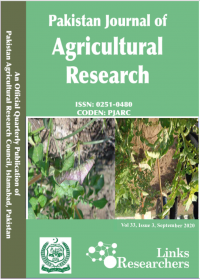Efficacy of Manually Prepared Single Super Phosphate Fertilizer on Rain-Fed Wheat Crop under Sub-Humid Climate
Efficacy of Manually Prepared Single Super Phosphate Fertilizer on Rain-Fed Wheat Crop under Sub-Humid Climate
Matiullah Khan*, Shameemul Sibtain Shah, Atiqullah Khan, Muhammad Sarwar and Shoaib Ahmed
ABSTRACT
Field experiments were conducted during 2015-16 at National Agricultural Research Center Islamabad to evaluate the availability of P from different particle size of Hazara rock phosphate (HRP) by manual preparation of Single Super Phosphate (SSP) through the procedure already established by the author and testing its efficacy in comparison to DAP on rainfed wheat. Almost 50 bags of SSP were prepared using formula “100 kg of indigenous HRP with total P2O5 content of X and mesh size 160 when treated with 60 liters (50% diluted) H2SO4 (volume/volume), followed by proper curing, yields SSP of almost X/2 % extractable P2O5”. The P was applied @ 57.5 kg P2O5 ha-1 both from prepared SSP and DAP to wheat crop on equal P2O5 basis. Also, Phosphate Solubilizing Bacteria (PSB) were tested in this experiment for yield and P uptake of the crop. The results showed that smaller the mesh size of HRP 200 mesh gave maximum available P2O5 14.27% followed by 160 mesh with 14.21%, from the stock grade HRP containing 28% total P2O5. The free acid contents were equal and lower (5%) in the prepared SSP for mesh size 160 and 200, against 6.3% when mesh size was 120. The SSP application as P source increased grain yield and total dry matter yield 2.5% and 4.7% over DAP, respectively. Similarly, SSP application enhanced P uptake of crop by 5.6% over DAP, however, no increase in postharvest soil P concentration was recorded. Seed inoculation with PSB significantly increased grain and dry matter yield. It can be concluded from the study that good quality of SSP can be manually prepared from HRP which may increase the yield comparable to DAP.
To share on other social networks, click on any share button. What are these?







